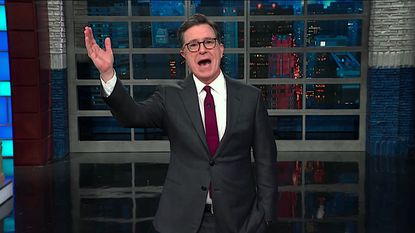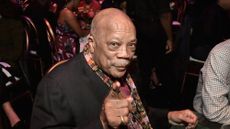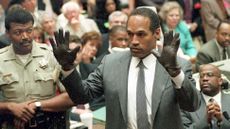Stephen Colbert lays out a theory on why Trump really fired Rex Tillerson


President Trump fired Secretary of State Rex Tillerson on Tuesday. "The strange part about this is ... everything," Stephen Colbert said on Tuesday's Late Show. "But strangest of all is how Trump told him, via tweet. ... What could be worse than learning you got fired from your boss' tweet? Oh, maybe seeing that 86,000 people 'liked' it. 'I lost my job but I am #trending,'" Colbert joked. "It's too bad Twitter wasn't around when Trump ended his first two marriages — back then he had to do it by fax."
The White House said it did not fire Tillerson by tweet, but via a phone call from Trump last Friday — but State Department spokesman Steve Goldstein contradicted that, saying Tillerson did not have advance warning and had planned to stay on. Colbert laid out a scenario where the White House apologized to Tillerson for getting it wrong, said he was just kidding, then explained what really happened: Trump fired Goldstein, too. Trump kind of elaborated on why he let Tillerson go, but one phrase caught Colbert's attention: "Rex will be much happier now? Every word in that sentence is what you say to a child when their dog has been put down."
So what was the final straw for Tillerson. "We don't know for sure — but yes we do, it was Russia," Colbert said, pointing out that just one day earlier, after the White House declined to blame Russia, Tillerson had strongly criticized Moscow for the attempted murder of a former Russian spy in Britain and said it would certainly "trigger a response." And it did, Colbert noted: "Goodbye, Rex. ... Tillerson should have known better. Russia has denied the whole thing, and the only thing worse than contradicting your boss is contradicting your boss' boss." Tillerson said his public farewells, but notably he "didn't mention Donald Trump" at all, Colbert said. "Sounds like Rex just made $130,000." Watch below. Peter Weber
Subscribe to The Week
Escape your echo chamber. Get the facts behind the news, plus analysis from multiple perspectives.

Sign up for The Week's Free Newsletters
From our morning news briefing to a weekly Good News Newsletter, get the best of The Week delivered directly to your inbox.
From our morning news briefing to a weekly Good News Newsletter, get the best of The Week delivered directly to your inbox.
Sign up for Today's Best Articles in your inbox
A free daily email with the biggest news stories of the day – and the best features from TheWeek.com
Peter has worked as a news and culture writer and editor at The Week since the site's launch in 2008. He covers politics, world affairs, religion and cultural currents. His journalism career began as a copy editor at a financial newswire and has included editorial positions at The New York Times Magazine, Facts on File, and Oregon State University.
-
 The teenage 'maths prodigy' who turned out to be a cheat
The teenage 'maths prodigy' who turned out to be a cheatUnder The Radar Jiang Ping defied expectations in a global competition but something wasn't right
By Chas Newkey-Burden, The Week UK Published
-
 Puppet shows, pagodas and pho: a guide to Hanoi
Puppet shows, pagodas and pho: a guide to HanoiThe Week Recommends Vietnam's capital city blends the ancient with the new
By Catherine Garcia, The Week US Published
-
 'There are benefits, but not acknowledging them would tell only half of the story'
'There are benefits, but not acknowledging them would tell only half of the story'Instant Opinion Opinion, comment and editorials of the day
By Justin Klawans, The Week US Published
-
 Quincy Jones, music icon, is dead at 91
Quincy Jones, music icon, is dead at 91Speed Read The legendary producer is perhaps best known as the architect behind Michael Jackson's 'Thriller'
By Peter Weber, The Week US Published
-
 OJ Simpson, star athlete tried for murder, dead at 76
OJ Simpson, star athlete tried for murder, dead at 76Speed Read The former football hero and murder suspect lost his battle with cancer
By Rafi Schwartz, The Week US Published
-
 Momofuku's 'Chili Crunch' trademark uproar
Momofuku's 'Chili Crunch' trademark uproarSpeed Read The company's attempt to own the sole rights has prompted backlash
By Rafi Schwartz, The Week US Published
-
 Kevin Hart awarded Mark Twain Prize
Kevin Hart awarded Mark Twain PrizeSpeed Read He is the 25th recipient of the prestigious comedy prize
By Peter Weber, The Week US Published
-
 Is Downton Abbey set to return for a final film?
Is Downton Abbey set to return for a final film?Speed Read Imelda Staunton reveals that a third movie may be in the pipeline
By Adrienne Wyper, The Week UK Published
-
 'Oppenheimer' sweeps Oscars with 7 wins
'Oppenheimer' sweeps Oscars with 7 winsspeed read The film won best picture, best director (Christopher Nolan) and best actor (Cillian Murphy)
By Peter Weber, The Week US Published
-
 'Rust' armorer convicted of manslaughter
'Rust' armorer convicted of manslaughterspeed read The film's cinematographer Halyna Hutchins was shot and killed by actor Alec Baldwin during rehearsal
By Peter Weber, The Week US Published
-
 The Beatles are getting 4 intersecting biopics
The Beatles are getting 4 intersecting biopicsSpeed Read Director Sam Mendes is making four separate movies, each told from the perspective of one band member
By Peter Weber, The Week US Published